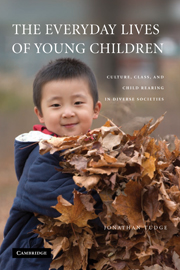Book contents
- Frontmatter
- Contents
- Preface
- Acknowledgments
- 1 Introduction and Stage Setting
- 2 The Daily Lives of Toddlers
- 3 Cultural–Ecological Theory and Its Implications for Research
- 4 Methods
- 5 Life in the Cities
- 6 Everyday Activities
- 7 Settings and Partners
- 8 Everyday Lives
- 9 The Cultural Ecology of Young Children
- References
- Index
- Frontmatter
- Contents
- Preface
- Acknowledgments
- 1 Introduction and Stage Setting
- 2 The Daily Lives of Toddlers
- 3 Cultural–Ecological Theory and Its Implications for Research
- 4 Methods
- 5 Life in the Cities
- 6 Everyday Activities
- 7 Settings and Partners
- 8 Everyday Lives
- 9 The Cultural Ecology of Young Children
- References
- Index
Summary
What is the city but the people?
William Shakespeare, Coriolanus, Act 3, Scene 1, 1623/1954, p. 719In this chapter, I want to introduce you to the places where we collected the data. As I mentioned in the previous chapter, just a single city was chosen from each of the societies where I wanted to conduct the research. I should be clear about the fact that I don't believe children living in any single city can in any way “represent” children across the entire society, or children from different regions of the country, different ethnic groups, or different social classes. This is no more appropriate than to imagine that an ethnography of a single hunter-gatherer tribe in the Congo can be generalized either to other hunter-gatherer groups in other parts of the world or to the experiences of other groups within the Congo. We already know, from the literature discussed in Chapter 2, that there are large differences in the everyday lives of young children who live in cities in the industrialized world and those who live in predominantly rural regions in the majority world. We have much less evidence about cultural diversity in children's experiences in cities in different parts of the world, whether thinking exclusively about cross-societal variation or about within-society heterogeneity.
However, cultural–ecological theory's concern with context should not be interpreted to mean simply the geographical, social, or cultural context but also the temporal context.
- Type
- Chapter
- Information
- The Everyday Lives of Young ChildrenCulture, Class, and Child Rearing in Diverse Societies, pp. 110 - 140Publisher: Cambridge University PressPrint publication year: 2008

